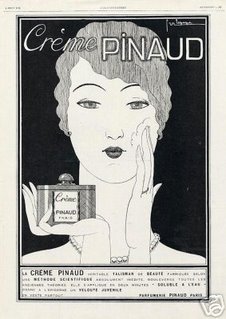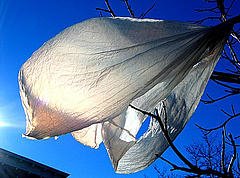Inside and Outside
 Every once in a while I look at myself in the mirror in the morning as I brush my teeth or comb my hair and wish with an irrational and depressing kind of intensity that I was better-looking. So in the afternoon I make a trip to the drug store and besides getting necessities like shampoo and toilet paper I guiltily add to my basket an expensive jar of face cream, a little container of eye shadow, a tube of lip gloss. If I feel really ambitious about my appearance I go to the mall to get a new pair of jeans and some nice tops (I usually buy t-shirts from Target).
Every once in a while I look at myself in the mirror in the morning as I brush my teeth or comb my hair and wish with an irrational and depressing kind of intensity that I was better-looking. So in the afternoon I make a trip to the drug store and besides getting necessities like shampoo and toilet paper I guiltily add to my basket an expensive jar of face cream, a little container of eye shadow, a tube of lip gloss. If I feel really ambitious about my appearance I go to the mall to get a new pair of jeans and some nice tops (I usually buy t-shirts from Target). Last weekend I was seized again by this fashion-and-beauty fit and spend fifty dollars on a pair of jeans at Macy's, the most I've ever shelled out for one piece of clothing. (Well, to be fair, I bought one pair of shoes that cost one hundred dollars and a formal dress that cost one fifty. But those were special-occasion purchases). This didn't happen out of the blue, as it usually does. I'd been watching "What Not To Wear" on TLC for a couple of weeks. (This is the curse of having TiVo, which makes sly and almost irresistible suggestions shows you'd never stumble on by yourself and that you thought you despised.) Against myself, though not against my better judgment, "What Not To Wear" persuaded that physical appearance -- and by this how you dress and groom yourself -- is a reflection of the self, that it reveals things about oneself that are not trivial, superficial.
I watched woman after woman being transformed on that show -- and not only outwardly. They admit that being nicely put together -- wearing decent clothes, a bit of make-up, and having a good haircut -- makes them feel better in their own skin and more confident about their abilities. Some of these women have not spent any money or attention on themselves -- one bought her clothes second-hand store for a dollar a pound, and another, a single mother, hadn't had decent haircut in years -- but lavished it on their families. It's touching, even for someone as fiercely unsentimental as I am, to observe them as they learn to place value on themselves -- and not only the monetary kind, although because of what this show is it begins with that, but as mothers and wives and friends, and simply as women. They begin to see themselves as persons of worth.
True, there's a tendency toward uniformization in that show, toward overspending ($300 for a jacket, no matter how wonderfully it fits you, seems unconscionably extravagant to me), and toward a certain kind of white and upper-middle class mentality (I've watched about five shows and have seen only one minority woman being "made over"). And like any other make-over show, "What Not To Wear" leans perilously close to the melodramatic, though I'd argue that it doesn't fall into it nearly as often as it could.
Despite all of this, though, I think it has something valuable to say about how we perceive and how we create value. I wish I could watch this show with my aunt, my father's older sister, whose appearance is a statement she makes consciously, and not with a little masochism, about herself. She wears tattered clothing, scuffed shoes, and does her hair twice a year for Easter and Christmas. She has sacrificed herself all her life for her children and her husband. And she looks it, and wants to look it. The sad and inevitable thing is that her sons and her husband treat her accordingly. I wish I could convince her to go on "What Not to Wear." I've very seldom seen her wearing beautiful clothes, and she is a beautiful woman, with a sharp and strange kind of beauty. She has the finest, clearest skin of anyone I know, blue eyes, a long slightly hooked nose, cheeks flushed just slightly with pink. She has one picture of herself when she was young -- she is alone in it, near a body of water, I don't remember if a lake or the sea; the person who took the picture was a young man she was in love with but didn't marry because it was socially unacceptable -- and she is stunning in it.
When I was little my mom used to take me with her to the salon when she had her facials done and waxed her legs and did her hair up for a New Year's Eve party or a wedding. The salon was very warm, and everyone gossiped, and the smells of cosmetics were intoxicating. This is the kind of experience of being a woman that men like to make fun of and use as proof of women's superficiality. But I sensed power buzzing in the overheated air of that salon, the power of stories and of secrets shared, some reluctantly, some extravagantly, of the closeness of clean, sweet-smelling bodies of mothers and daughters, grandmothers and aunts, best enemies and best friends.


